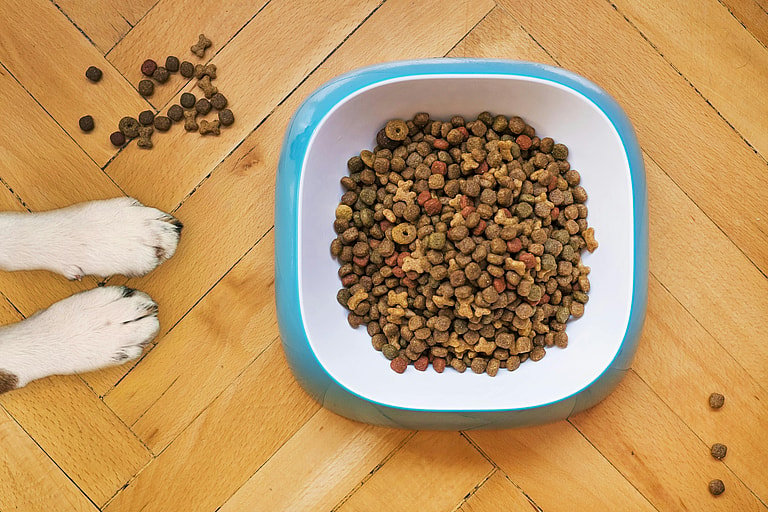Dog Wouldn’t Eat After Being Abandoned & Abused—Then Vets Found the Hidden Cause of His Suffering
A small dog named Frost was found lying on the side of the road, barely breathing, with a deep gash on his head. It’s unclear how he ended up in this condition, but his injuries suggested possible abuse. Fortunately, AMA Animal Rescue, a New York-based organization, stepped in to provide him with the critical care he needed. However, he was still struggling to eat. (watch TikTok below)

Vets Discovered Why The Dog Wasn’t Eating
As the vets investigated Frost’s difficulty with eating, they discovered the cause: most of his teeth were severely decayed, causing him intense pain and preventing him from being able to eat properly. To relieve his suffering, the rescue arranged for dental surgery, during which 23 of Frost’s teeth had to be removed due to their poor condition.

Following this, Frost understandably went through a long healing period. But the dog finally felt safe and happy under the rescue’s care.
@amaanimalrescue Incredible rescue story of an abused and neglected pup named Frost 🙏🏼 #amaanimalrescue #poodlesoftiktok #adoptdontshop #rescuedog ♬ original sound – Angels for Mistreated Animals
Overcoming The Odds To Find A Forever Home
Frost was on the brink of death but thanks to AMA Animal Rescue and everyone who supported them, the dog is now living a life filled with love and happiness. A few weeks after the dog was completely healed from the dental surgery, a family fell in love with him and took him home.
In his new home, Frost receives a lot of adoration from his pet parents. Additionally, he now has two fur siblings to play with in his family’s big yard. He is still learning how to play with toys, but the dog has left a painful past behind him to welcome a life filled with hope and love.

Frost’s story serves as a powerful reminder that love and kindness can profoundly transform a dog’s life, offering them a chance at a brighter future.
If your dog, like Frost, is not eating food, it can be a cause of concern. Let’s explore the various possible reasons behind your dog not touching their favorite meal.
Why Is My Dog Not Eating?
Just as humans have various reasons for losing their appetite, there can be a range of factors behind “Why is my dog not eating his or her food?.” According to a veterinarian, Dr. Ghanasyam Bey, “Often, dogs lose their appetite for many of the same reasons humans do, such as dental issues, pain, not liking their food, and stress.” He provides the following major causes of your dog’s loss of appetite:

1. Fussy Eater
If your dog is being finicky, think about their eating history. If they’ve always been picky but remain healthy, with a healthy weight and shiny coat, there’s likely no need to worry. However, if dogs stop eating suddenly, parents should check whether the food is spoiled. Feeding table scraps can also create fussiness, as dogs may hold out for better options.
2. Medical Conditions
If your dog’s appetite decreases, look for accompanying symptoms that may indicate an underlying medical condition:
- Vomiting
- Weight loss
- Lethargy
- Coughing
- Sneezing
- Diarrhea
- Excessive drooling
- Heightened thirst and more frequent urination
- Struggling to breathe properly
If you notice any of these signs, consult a veterinarian to rule out potential underlying causes, including:
- Infections
- Cancer
- Liver disease
- Kidney problems
Prompt evaluation and diagnosis are crucial to ensure your dog receives timely and effective treatment.
3. Dental Issues
If your dog’s enthusiasm for their regular meals has waned, dental issues may be the culprit, as was in Frost’s case. Your veterinarian should check their teeth to rule out dental pain while chewing or biting.
Common Signs of Canine Dental Problems:
- Cracked or loose teeth
- Foul-smelling breath
- Difficulty chewing hard food
- Excessive drooling
- Sneezing or nasal discharge
- Facial swelling
- Facial and mouth sensitivity
- Bleeding from the mouth or gums
Regular dental check-ups, X-rays, and brushing teeth can help prevent bacterial buildup below the gum line. This helps in reducing the risk of serious and widespread infections that can compromise your dog’s overall health.
4. Pain
Pain can significantly reduce your dog’s appetite, and its source can be anywhere in the body. Pain from various sources can suppress your dog’s interest in food:
- Infections
- Dental issues
- Back problems
- Arthritis
- Stomach issues
Dr. Bey further claims, “Other times, tummy pain results when a dog gets into something they shouldn’t, such as garbage, chocolate, caffeine, and other toxic substances.”
5. Food Bowl
Believe it or not, your dog’s food bowl can determine their eating habits. How large and small is the food bowl, how is it made, and how high or low is it placed – all of this can affect your dog’s wish to eat the food or not. For instance, senior dogs with arthritis might find raised bowls more comfortable, while flat-faced breeds like pugs or French bulldogs benefit from wide, shallow dishes for easier access to their food.
Moreover, remember to clean your dog’s bowls regularly because leftover food can quickly make mealtime unappealing for your pup.
6. Behavior Problems
Dogs sometimes refuse to eat due to behavioral concerns related to their environment. “For example, feeding your dog around other dogs or in the same area as a food-aggressive dog may cause your dog anxiety.”

To address this, establish a quiet, designated feeding area for your dog, away from distracting stimuli. If you have multiple dogs, try to provide each of them with their own individual feeding space to minimize competition and stress.
7. Anxiety, Stress, and Depression
It is not uncommon for dogs to feel anxiety, stress, or depression as humans do from time to time. They may also show the same symptoms as people do, including, loss of appetite. Several factors can contribute to stress or depression in dogs, such as:
- Separation Anxiety: As per Wag, loss of appetite is a major symptom of separation anxiety, that can develop when your dog is home alone or away from their favorite humans for too long.
- Relocation: Moving to a new home can be unsettling for dogs.
- Loss: The loss of a beloved human or canine companion can cause significant emotional distress.
- Lack of Stimulation: Insufficient mental and physical stimulation can lead to boredom and depression.
- Schedule Changes: Major changes in the family’s routine can disrupt a dog’s sense of security.
- New Additions: Introducing a new baby or pet to the home can sometimes trigger anxiety or jealousy in existing dogs.
If your dog’s appetite remains abnormal for more than two days, consult a veterinarian. If accompanied by vomiting, diarrhea, or lethargy, seek immediate veterinary attention. Loss of appetite can signal illness. Provide your vet with detailed information about your dog’s symptoms, including their interest in food, to help in the correct diagnosis.
Frequently Asked Questions (FAQs)
Why is my dog not eating but drinking water?
According to Lincolnway Veterinary Clinic, chronic illness can be the cause behind a dog not eating but drinking water. They say, “If your dog is avoiding food but is drinking excessive amounts of water—much more than is normal for him—this is a telltale sign that he has developed diabetes.” Other possible illnesses can be liver issues and kidney disease.
Why is my dog hiding food and not eating?
Dr. Fiona Lee explains that dogs might hoard food due to either insufficient or excessive food intake. In multi-dog households, concerns about food scarcity can lead to hoarding. Overfeeding can also cause hoarding as dogs may save excess food for later. Furthermore, hoarding behavior can stem from an inconsistent feeding schedule.
Why is my dog not eating and lethargic?
If your dog isn’t eating and is also lethargic, either your dog may be stressed or depressed, or there is an underlying health problem. Apart from lethargy and not eating food, additional symptoms such as vomiting, coughing, weight loss, upset stomach, and difficulty in breathing warrant veterinary attention.
Why is my dog not eating and shaking?
Windermere Veterinary Services assert that reduced appetite along with shaking and shivering can be a sign of a medical illness called canine distemper. Other symptoms include coughing, nasal discharge, fever, lack of energy, eye discharge, and vomiting.

